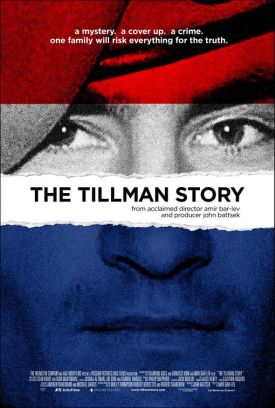Tillman Story, The
Ari Karpel, writing in The New York Times asks, “When information about a war comes from a government eager to promote and justify it, how can we know which parts to believe and which to reject as propaganda?” It’s a good question, even if it does make the questionable and, as we shall see, self-contradictory assumption that all propaganda is to be rejected merely as such. Here’s another. When information about a war comes from an anti-war film-maker eager to denigrate and discredit it and as many as possible of those who are in charge of fighting it, how then can we know which parts to believe and which to reject as propaganda? Somehow, that question never occurs to Mr Karpel, or to Amir Bar-Lev, the director of the anti-war documentary, The Tillman Story, he is boosting. Both would have done well to have thought just a bit about it before they launched into their own careers as propagandists.
There is a superficial similarity between the unattractiveness of the two kinds of propaganda in this case — I mean apart from the fact that they are both propaganda which to some is unattractive enough in itself. The politics of America’s “creative” classes, especially the Hollywood local of the beautiful people’s union, bears approximately the same relation to reality as the Army’s concocted story about the heroic death in Afghanistan six years ago of Cpl Pat Tillman, the Arizona Cardinals’ defensive back who gave up a multi-million dollar contract to join the Army Rangers. Now the two fantasies have a fantastical clash in Mr Bar-Lev’s movie in which, as you will not be surprised to learn, the political fantasy comes out on top, leaving our nation’s armed services, like the Bush administration which is the movie’s real target, in a state of pitiable disgrace. Fortunately, this, too, is a merely fantastical product of the Hollywood dream factory.
As earnest of their bona fides, the film-makers have taken the Tillman family with them into automatic conspiracy mode — an assumption of deceit and coverup that goes well beyond the evidence supplied by the original deception, which claimed that Cpl. Tillman had been killed by enemy fire while heroically rescuing some of his fellow Rangers caught in an ambush. But neither the nobility of Pat Tillman’s sacrifice nor the family’s bereavement nor the fact that they were lied to about it should put them beyond criticism. The vitriol of their angry exchanges with the Pentagon, in which they appear to have been egged on by the film-makers and other anti-warriors, and their assumption, shared by the film-makers, of the corruption of America’s political and military establishment may be gratifying to the kind of people who make up the majority of movie-goers these days but it will strike those outside that community of opinion as being almost as graceless as the drunken eulogy at a memorial for Pat of his younger brother Richard who, with glass of beer in hand, informed those gathered to pay their respects: “He’s not ‘with God,’ he’s f***ing dead!”
The justification for such boorish behavior is that Pat “wasn’t religious,” a fact which, to Richard and others means “he’s not what these people” — that is, patriotic Americans who want to honor American heroes — “wished he was.” Fair enough, perhaps, but how is that a justification for insulting and repudiating those who seek to honor someone whose deeds, truly, speak more loudly than his words? To believe either in nobility and sacrifice or in God and the afterlife where the truth is murky — as it so often is on the battlefield and in religious faith as elsewhere in life — is not discreditable and certainly not the same thing as “lying.” It is, rather, an act of faith and generosity. And with all due allowance for the fact that the family were lied to in the initial story of Tillman’s heroic death, could not the same charitable construction be put upon the Pentagon’s mistaken fabrication? At any rate, it doesn’t follow that there was, as the film-makers would wish us to believe, a vast conspiracy encompassing the whole of the military and civilian hierarchy in the Bush administration, or that they were all “lying” in order to justify the war in Afghanistan.
The assumption that they were comes, we gather, from the fact that the other Tillmans now and Pat retrospectively (in their eyes) were skeptical as to the war’s legality or necessity or both. Their political motive is also evident to me in the remarkable fact of the film’s utter incuriosity both about who actually killed Cpl Tillman and why and who concocted the lie about his heroic death, facing the enemy, and why. Having such a mundane solution to the mystery would deprive them of their conspiratorial assumptions, I suppose. The answers to both questions should have been readily discoverable by any of the various internal Army investigations that followed the exposure of the deception, but neither Mr Bar-Lev or the Tillmans appear to have any interest in finding out the answers to them. Like certain prosecutors we could mention, they care nothing about the original crime, if it was a crime, or the truth of what happened that day in April, 2004 but only about the bureaucratic cover-up which may be supposed by the conspiracy-minded to involve politically more important targets than the trigger-happy grunts who presumably did the deed or their immediate superiors who must have taken it upon themselves to tell a more publicly acceptable story about it — if only out of consideration for the family’s feelings.
Mr Bar-Lev’s camera rejoices in the appearance en masse of the forces’ top brass, together with former Secretary of Defense Donald Rumsfeld, before Henry Waxman’s congressional committee in 2007 to deny that they knew anything about the matter, and the possibility that they actually didn’t know anything about it, or remember when they first learned about it, which common sense might timorously put forward, is not even considered. The mere appearance of evasiveness on their part is enough, it seems, to confirm Mr Bar-Lev in what I’m afraid comes across as his a priori assumption that the cover-up went, as they say, “all the way to the top.” That, in turn, would confirm him (and the family) in their now-stated view that Cpl. Tillman was being used as a “propaganda tool” or “a publicity pawn for the war” as Mr Karpel puts it. Yet what else is he here but a propaganda tool to Mr Bar-Lev and his anti-war, anti-Bush champions and a publicity pawn for them to sell their movie? Though they obviously have an interest portraying him as eager to be the latter kind of tool or pawn as he was unwilling to be the former kind, it is by no means clear from the movie that he would have been so.
“Lies” are of course of many kinds, and the kind that were told to the family of Corporal Tillman by the Army, regrettable though they may be, seem to me to be far more benign and forgivable than the ones now being told — or, more often, insinuated — by the propagandists against America’s wars on terrorism. Throughout his piece, Mr Karpel suggests that propaganda is ipso facto wrong and dishonest, irrespective of the war it serves. It may be so, but you’d think he would at least give a nod to the question of whether or not it is possible to fight a war without it. If, as I suspect, it is not, then it leads me to believe that the anti-war propagandists are, in fact, pacifists who oppose propaganda for the same reason that they oppose war: not because of any considered assessment of the justice or necessity of any particular conflict but because their aim is simply to make war, any war, impossible. Theirs is the attitude of those who sport the bumper-sticker, “I’m already against the next war.”
Of course what they will prevent, if they are successful, is not war but the defense of America, which has a long, rich and, some would say, suicidal tradition of indulgence towards those of its own citizens who oppose its self-defense. Such people, insofar as they have any influence in the world, can only prevent us from fighting back, not our enemies from attacking us. They are still in thrall to the old hippie pseudo-profundity, “What if they gave a war and nobody came?” But we know very well what would happen if “they” gave a war and “nobody” came. “They” would win and the clever nobodies who think they can avoid it by not showing up would lose. Losing a war obviously holds no terrors for them, but we might want to ask somebody who has lost one — a South Vietnamese, a Cambodian, an Iraqi Shi’ite after the first Gulf War, for example — how they feel about it before the rest of us accept such defeatism and insouciance as our national defense policy. Meanwhile, pity the shade of Pat Tillman, that this sorry bit of propaganda against the cause he gave his life for should be labeled as his story.
Discover more from James Bowman
Subscribe to get the latest posts to your email.






